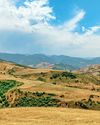
EARLY ON A WARM FEBRUARY morning, a group of 10 women, ranging in age from 50 to 60, sit on the sandy shores of Akkal Madam beach on India’s Pamban Island, carefully bandaging their fingers. Wearing colourful blouses and saris, they wind thick strips of cloth over each digit and secure the ends with string. It takes them over 20 minutes.
The bandages, they’ve found, are the best way to protect their hands from sharp rocks on the seabed when they go underwater to dive for seaweed, which they sell to a local factory.
“This is how we get ready,” says Bhagavathy. “We’ve tried gloves before, but they always slip away in the strong currents. And injuries are so common when your fingers are exposed.”
Bhagavathy knows what she’s talking about. Now in her mid-60s, she has been collecting seaweed since she was seven.
To keep the rocks from tearing at their feet, the women wear rubber slippers. They strap on goggles since they’ll be underwater with frequent dives each lasting up to two to three minutes over a five to six-hour day. They’re mastered the art of holding their breath during these dives.
“It’s not for the faint-hearted. That’s why you won’t see any men here,” Bhagavathy jokes. The other women laugh as they wade into the warm waters.
Modern times and modern problems have made it harder to succeed in this old-fashioned occupation. A growing number of marine heat waves are causing a dropoff in the types of seaweed they gather. What’s more, the government now prohibits seaweed extraction in some areas to promote ocean health.
This story is from the {{IssueName}} edition of {{MagazineName}}.
Start your 7-day Magzter GOLD free trial to access thousands of curated premium stories, and 9,000+ magazines and newspapers.
Already a subscriber ? Sign In
This story is from the {{IssueName}} edition of {{MagazineName}}.
Start your 7-day Magzter GOLD free trial to access thousands of curated premium stories, and 9,000+ magazines and newspapers.
Already a subscriber? Sign In

Demonstrators by Krishna Reddy
1968 Multicolour viscosity, Print on paper

Notes from Grief Camp
Every summer, more than a hundred children come together to spend a weekend swimming, climbing and canoeing. They also learn to deal with death

Six Places Cheese Lovers Should Visit
Ancient caves, monasteries, and other must-sees for fromage fans

THE LAND OF SUPERCEN TENARIANS
A remote region of Azerbaijan claims to have many extremely long-lived residents. What is their secret, or is it just a myth?

The Whistle Blowers
My grandparents had a distinctive way of communicating

"THE NEXT AIRCRAFT WILL CRASH ON LANDING"
THE JET WAS ALMOST OUT OF FUEL. THE PILOTS' ONLY OPTION WAS A MANOEUVRE NO ONE HAD EVER ATTEMPTED.

The Secrets in our Genes
Genomic sequencing tests can reveal much about your unique physiology. But are they worth it?

GOOD NEWS FROM AROUND THE WORLD
MENTAL HEALTH When her son was arrested last year, Tambudzai Tembo's mind went to dark thoughts of suicide.

Into the Inferno
A gas station owner has seconds to react when a car crashes into a gas pump

THE CLIMATE CHANGERS
THESE PLACES ARE LEADING THE WAY TO A FUTURE FREE OF FOSSIL FUELS